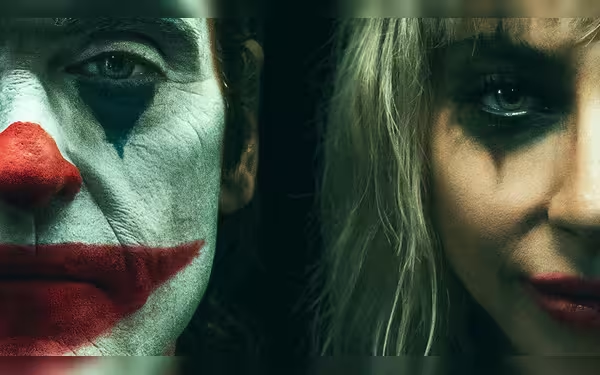Saturday, November 16, 2024 07:33 PM
Joker Folie à Deux: Controversial Twist Disappoints Fans
- Mixed reception for Joker: Folie à Deux sequel.
- Lady Gaga's role as Harley Quinn underutilized.
- Twist ending undermines Arthur Fleck's character journey.
 Image Credits: ign_pk
Image Credits: ign_pkJoker: Folie à Deux faces mixed reviews, with a controversial twist disappointing fans and underutilizing Lady Gaga's Harley Quinn.
The highly anticipated sequel, "Joker: Folie à Deux," has finally hit theaters, but it has not been met with the same enthusiasm as its predecessor. Directed once again by Todd Phillips, this film follows the story of Arthur Fleck, played by Joaquin Phoenix, who first captured audiences' hearts in 2019. However, this time around, the reception has been mixed, with many critics expressing disappointment in various aspects of the film.
Critics have pointed out several flaws in "Joker: Folie à Deux," including its slow pace, lack of focus, and poorly executed musical sequences. One of the most significant criticisms is the underutilization of Lady Gaga, who plays Harley Quinn. Many viewers are left wondering why her character was included at all, given her limited role in the film. The film's twist ending has also sparked debate, as it seems to undermine the significance of both this film and the original.
At its core, "Joker: Folie à Deux" appears to be struggling with its identity. It tries to present itself as a serious character study while simultaneously attempting to fit into the musical genre. This conflict leads to a disjointed viewing experience, leaving audiences questioning the film's purpose. The film's biggest surprise is its twist ending, which reveals that Arthur Fleck is not truly the Joker. Instead, he admits in court that the Joker persona is not a separate identity, but rather a part of himself. This revelation disillusions Harley Quinn, who realizes she loves the Joker, not Arthur.
As the story unfolds, Arthur's fate takes a dark turn. He is killed by an unnamed inmate in Arkham, who stabs him repeatedly before giving himself a sinister smile. This moment raises questions about the film's narrative choices, as it seems to suggest that Arthur's death is merely a stepping stone for the real Joker's origin story. This twist feels frustrating, especially after investing time in two films centered around a character who ultimately does not fulfill the expectations set by the title.
In comparison, the first "Joker" film faced criticism for its similarities to Martin Scorsese's works, particularly "The King of Comedy." However, some argued that in today's Hollywood landscape, filmmakers must find ways to incorporate character-driven stories into franchise films to get them made. Yet, after two films, Arthur Fleck still feels like a shallow character, and the sequel seems to be a reaction against the very franchise it belongs to.
The title "Folie à Deux," which translates to "madness for two," is misleading, as the relationship between Fleck and Harley does not receive the attention it deserves. Instead, the film focuses on Fleck's incarceration, leaving little room for their dynamic to develop. This lack of depth ultimately detracts from the film's overall impact.
While "Joker: Folie à Deux" attempts to deliver a unique twist on the superhero genre, it falls short of its ambitions. The film's ending, which reveals Arthur is not the Joker, feels more like an insult to the audience than a clever narrative choice. Unlike other films that have successfully subverted expectations, such as "Iron Man 3," this sequel lacks a meaningful artistic purpose. As viewers, we are left pondering the significance of the journey we took with Arthur Fleck, only to find that it may have been for naught. The film serves as a reminder that not all sequels can capture the magic of their predecessors, and sometimes, the most anticipated stories can leave us feeling disappointed.













